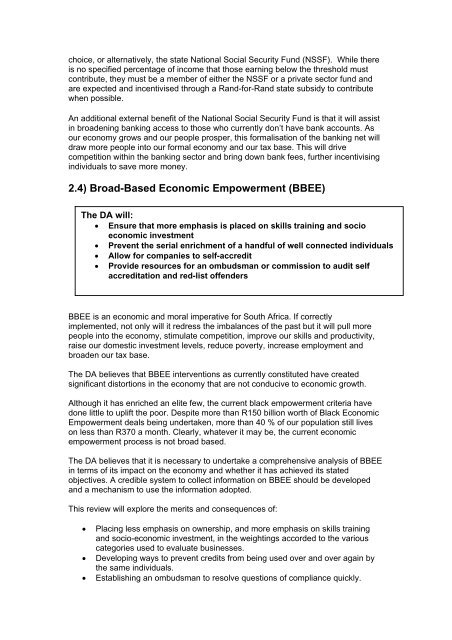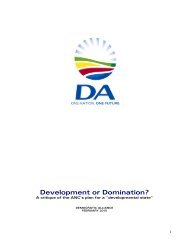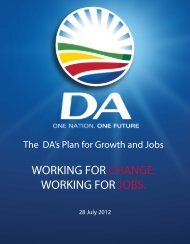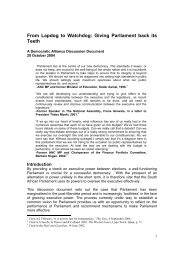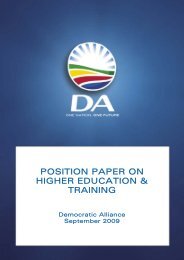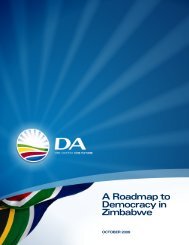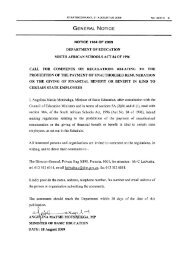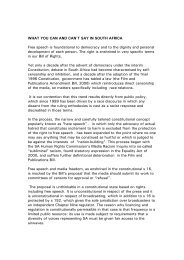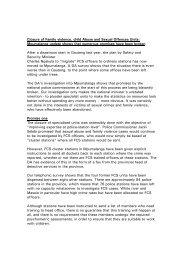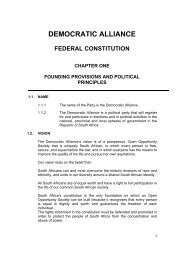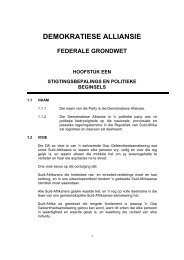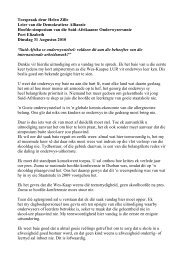Economic policy.pdf - Democratic Alliance
Economic policy.pdf - Democratic Alliance
Economic policy.pdf - Democratic Alliance
You also want an ePaper? Increase the reach of your titles
YUMPU automatically turns print PDFs into web optimized ePapers that Google loves.
choice, or alternatively, the state National Social Security Fund (NSSF). While there<br />
is no specified percentage of income that those earning below the threshold must<br />
contribute, they must be a member of either the NSSF or a private sector fund and<br />
are expected and incentivised through a Rand-for-Rand state subsidy to contribute<br />
when possible.<br />
An additional external benefit of the National Social Security Fund is that it will assist<br />
in broadening banking access to those who currently don’t have bank accounts. As<br />
our economy grows and our people prosper, this formalisation of the banking net will<br />
draw more people into our formal economy and our tax base. This will drive<br />
competition within the banking sector and bring down bank fees, further incentivising<br />
individuals to save more money.<br />
2.4) Broad-Based <strong>Economic</strong> Empowerment (BBEE)<br />
The DA will:<br />
• Ensure that more emphasis is placed on skills training and socio<br />
economic investment<br />
• Prevent the serial enrichment of a handful of well connected individuals<br />
• Allow for companies to self-accredit<br />
• Provide resources for an ombudsman or commission to audit self<br />
accreditation and red-list offenders<br />
BBEE is an economic and moral imperative for South Africa. If correctly<br />
implemented, not only will it redress the imbalances of the past but it will pull more<br />
people into the economy, stimulate competition, improve our skills and productivity,<br />
raise our domestic investment levels, reduce poverty, increase employment and<br />
broaden our tax base.<br />
The DA believes that BBEE interventions as currently constituted have created<br />
significant distortions in the economy that are not conducive to economic growth.<br />
Although it has enriched an elite few, the current black empowerment criteria have<br />
done little to uplift the poor. Despite more than R150 billion worth of Black <strong>Economic</strong><br />
Empowerment deals being undertaken, more than 40 % of our population still lives<br />
on less than R370 a month. Clearly, whatever it may be, the current economic<br />
empowerment process is not broad based.<br />
The DA believes that it is necessary to undertake a comprehensive analysis of BBEE<br />
in terms of its impact on the economy and whether it has achieved its stated<br />
objectives. A credible system to collect information on BBEE should be developed<br />
and a mechanism to use the information adopted.<br />
This review will explore the merits and consequences of:<br />
• Placing less emphasis on ownership, and more emphasis on skills training<br />
and socio-economic investment, in the weightings accorded to the various<br />
categories used to evaluate businesses.<br />
• Developing ways to prevent credits from being used over and over again by<br />
the same individuals.<br />
• Establishing an ombudsman to resolve questions of compliance quickly.


